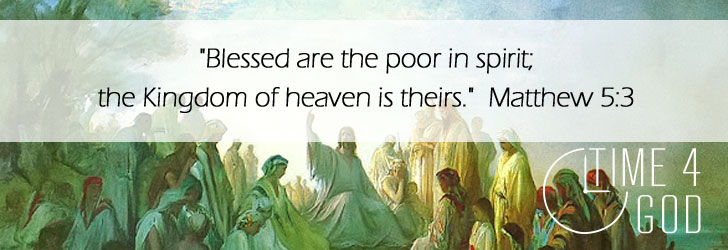Blessed Are the Poor
In Jesus’ time and throughout much of the Church’s history, pastoral images were very effective teaching tools. Most people were farmers, serfs, tenant farmers, simple laborers in the fields. They were mostly poor and mostly powerless.

In Jesus’ time and throughout much of the Church’s history, pastoral images were very effective teaching tools. Most people were farmers, serfs, tenant farmers, simple laborers in the fields. They were mostly poor and mostly powerless. They knew only hard labor during the whole year, and they often knew the pangs of hunger. For most of human history this was the reality for the majority of the peoples. The wealthy controlled their lives, used them, and mostly never thought of them.
Though most people now live in large cities or towns and the suburbs around them, poverty still remains a reality for too many people living in our midst. Often these people are out-of-sight and out-of-mind for most of us, that is, unless we are one of those poor. I ran across the following homily in my readings today and thought I would offer it here as a prayerful meditation. Sit with the Lord and let these words speak to your heart. This is from Basil the Great, one of the early Church Fathers.
[content-ad]
ʺAre you poor? There is someone much poorer than you are. You have enough bread for ten days; another has enough for one. As someone good and kind-hearted, make your surplus equal by distributing it to the needy. Do not shrink from giving of the little you have; do not value your own calamity above the common trial. Even if the food supply amounts to one loaf of bread, and the beggar stands at the door, bring the one loaf out of the storeroom and, presenting it to the hands which are lifted up to heaven, offer this merciful and considerate prayer:
‘One loaf which you see, O Lord, and the problem is evident; but as for me, I prefer your commandment to myself and I give of the little I have to the starving brother; for you also give to your servant in trouble. I know your great goodness and I also confidently believe in your power, for you do not defer your grace for another time, but disperse your gifts when you wish.
And if you speak and act in this way, the bread that you should give out of your scarcity would become seed for planting, would bear rich fruit, a pledge of sustenance, a patron of mercy.ʺ Basil the Great (ca. 329-379)
This was one of the things that the early Church did every day, and it was one of the reasons why it grew so quickly. It modeled a community that was rooted in its faith in the Living God, in Jesus the Christ. Those early Christian communities were the presence of that Living God in the midst of every city, town, and countryside village in which they lived. They lived what Christ taught. They served rich and poor alike. They made no distinctions. They saw every person, rich or poor, as a child of God, a brother, or a sister. And they taught the selfless love of Jesus, not just with their words, but their every action. They brought both the rich and the poor out of their self-concern, and into a self-less, loving concern for one another.
The poor will always be with us, Jesus said. Why? Rather than look at this question from the usual political and sociological perspectives, think of it this way: Maybe they are with us to challenge us to open our own, too often, stingy hearts. Maybe they are there to invite us to come out of our self-centeredness, to serve them out of love and, in doing so, we, too, would be obeying the Great Commandment; ʺLove your neighbor as yourself.ʺ Maybe in seeing and serving the poor we will meet Jesus face to face. Maybe, if we treat the poor one before us as our brother, our sister, we will empower and liberate each other to experience the kingdom of God in one another. Did not Jesus tell us: ʺBlessed are the poor in spirit; the Kingdom of heaven is theirs.ʺ (Matthew 5:3)
SKM: below-content placeholderWhizzco for FHB

